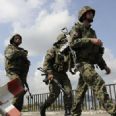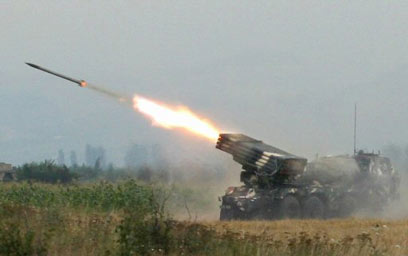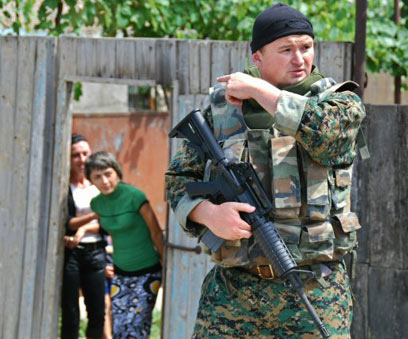
About 1,400 people have died as a result of "Georgian aggression" against South Ossetia, the president of the Georgian breakaway region was quoted by Interfax news agency as saying on Friday.
"About 1,400 died. We will check these figures, but the order of the numbers is around this. We have this on the basis of reports from relatives," Eduard Kokoity was quoted as saying by Interfax news agency.

Heavy fighting (Photo: AFP)
Tensions over Georgia's rebel territory of South Ossetia exploded on Friday when Georgia tried to assert control over the region with tanks and rockets, and Russia sent forces to repel the assault.
US tells Russia to 'cease attacks'
Later Friday, the United States called on Russia to halt aircraft and missile attacks in South Ossetia.
"The United States calls for an immediate ceasefire to the armed conflict in Georgia's region of South Ossetia," US Secretary of State Condoleezza Rice said in a statement. "We call on Russia to cease attacks on Georgia by aircraft and missiles, respect Georgia's territorial integrity, and withdraw its ground combat forces from Georgian soil."

Fighting rages in and around capital (Photo: AFP)
Fighting between Georgian forces and Russian-backed separatists raged in and around Tskhinvali, the capital of South Ossetia, after Tbilisi sent troops to take back the territory, which broke away in the 1990s.
A senior Georgian security official said Russian jets had bombed the Vaziani military airbase outside the Georgian capital Tbilisi, and President Mikheil Saakashvili said 150 Russian tanks, armored personnel carriers and other vehicles had entered South Ossetia from neighboring Russia.
He also said Georgian forces had downed two Russian jets.
'Town is practically destroyed'
The Russian RIA news agency quoted a source in the regional Russian military headquarters as saying Russian armor had rolled into Tskhinvali, which Georgia had earlier claimed to have "freed". There was no immediate confirmation from Russia that it had sent bombers.
The crisis, the first to confront Russian President Dmitry Medvedev since he took office in May, looked close to spiraling into full-blown war in a region emerging as a key energy transit route, and where Russia and the West are vying for influence.
The roar of warplanes and the explosions of heavy shells were deafening more than three km (two miles) away from Tskhinvali. Many houses were ablaze.
Marat Kulakhmetov, commander of Russian peacekeepers in the territory, told Interfax by telephone from Tskhinvali: "As a result of many hours of shelling from heavy guns, the town is practically destroyed."
Reuters and AP contributed to this report















